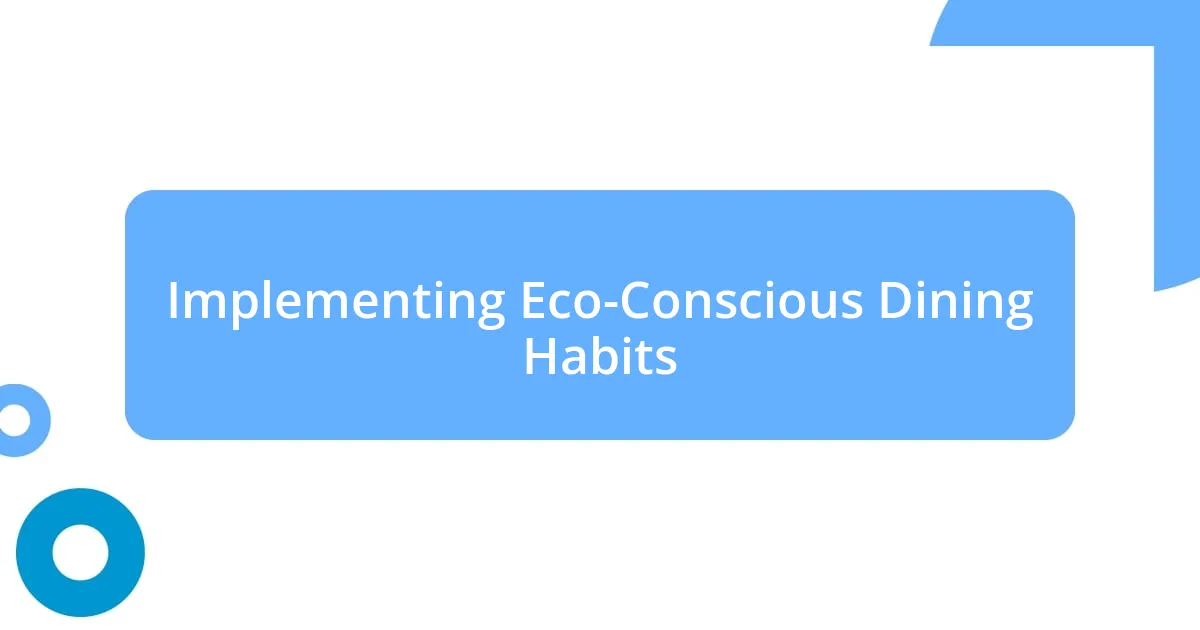Key takeaways:
- Eco-friendly dining involves making conscious choices, such as selecting local, organic, and seasonal ingredients to support sustainability.
- Adopting zero waste practices, like composting and using reusable items, significantly reduces environmental impact and enhances the dining experience.
- Exploring plant-based options can lead to healthier meals and contribute positively to the planet.
- Evaluating restaurants for their sustainability practices, such as local sourcing and waste management, deepens appreciation for meals and encourages responsible consumer habits.

Understanding Eco-Friendly Dining
Eco-friendly dining is about making mindful choices that reflect a commitment to sustainability. When I first started exploring this lifestyle, I was surprised by just how many small changes could make a difference. Have you ever considered how your dining habits can impact the planet?
For me, one standout experience was visiting a local restaurant focused on farm-to-table practices. The freshness of the ingredients not only enhanced the flavors but also gave me a sense of connection to the land and the people who grew the food. It sparked a realization: when we choose local and organic produce, we’re not just eating; we’re supporting our community and reducing our carbon footprint.
Understanding eco-friendly dining involves recognizing the larger systems at play, from food sourcing to waste management. It’s empowering to realize that each meal is an opportunity to make conscious choices and contribute to a healthier planet. Have you ever thought about the impact of plastic straws? It’s these seemingly minor details that can collectively lead to significant change, both in our dining experiences and for the environment.

Choosing Sustainable Ingredients
Choosing sustainable ingredients has become a cornerstone of my dining philosophy. I remember a time when I purchased produce imported from thousands of miles away, completely unaware of the environmental costs associated with it. Now, I actively seek out seasonal fruits and vegetables from my local farmers’ market. The experience is so much more rewarding because I know I’m supporting local agriculture while enjoying food at its peak freshness.
Consider these impactful choices when selecting your ingredients:
- Locally Sourced: Prioritize produce and products that are grown or produced within your region to reduce transportation emissions.
- Organic Options: Look for organic certifications, which often indicate safer farming practices that are better for the environment and reduce chemical runoff.
- Seasonal Produce: Eating what’s in season not only benefits the planet but also often results in a tastier and more nutritious meal.
- Humanely Raised: If you consume animal products, choose those that are sustainably sourced and raised with ethical treatment in mind.
- Plant-Based Focus: Incorporating more plant-based meals into your diet can significantly lower your carbon footprint while also offering health benefits.
By making these choices, I feel like I’m cultivating a positive relationship with the food I eat and the earth itself, each ingredient carrying a story that adds depth to my dining experience.

Adopting Zero Waste Practices
Adopting zero waste practices is truly a transformative step in eco-friendly dining. I recall my first attempt at a zero waste meal; I took my own containers to a bulk food store, unsure of what to expect. To my surprise, not only did it reduce the amount of plastic I typically accumulated, but it also felt incredibly gratifying to see my containers filled with fresh ingredients, knowing I was making a positive impact. Every time I do this, it reminds me that dining can be a deliberate act of sustainability rather than a mindless routine.
One of the cornerstone practices I embraced was composting my food scraps. Initially, I was hesitant and wondered if it would be worth the effort. Then I discovered how easy and rewarding it could be. It felt like turning my waste into something valuable – nourishing my garden instead of contributing to a landfill. Watching the transformation of my scraps into rich compost underscored a beautiful cycle of renewal in my kitchen. Have you ever thought about how much of your kitchen waste could be repurposed in such a way?
Finally, I encourage utilizing reusable items whenever possible, from cloth napkins to glass straws. It may seem like a small gesture, but I’ve found that these little swaps accumulate into significant reductions in waste. I often remember the thrill of giving up paper towels and switching to cloths; not only did it help the environment, but it also added a personal touch to my dining setup. It’s amazing how these practical shifts can enhance the overall dining experience while aligning with my values of sustainability.
| Zero Waste Practice | Benefits |
|---|---|
| Using Reusable Containers | Reduces plastic waste and encourages mindful shopping. |
| Composting | Transforms food scraps into nutrient-rich soil, reducing landfill contributions. |
| Adopting Cloth Over Disposable | Minimizes waste while adding a personal, aesthetic touch to your dining experience. |

Exploring Plant-Based Menu Options
Exploring plant-based menu options has truly expanded my culinary horizons. I vividly remember my first experience with a fully plant-based dish; it was a creamy cashew pasta that left me wondering why I’d never tried making animal-free sauces before. The rich flavors, combined with the knowledge that I was choosing a healthier and more sustainable option, felt incredibly rewarding.
It’s fascinating how plant-based ingredients can be both vibrant and versatile. When I ventured into cooking with lentils, I discovered they are not only protein-packed but also hearty enough to satisfy any meat lover. Crafting a warm lentil salad with roasted vegetables opened my eyes to the creative possibilities in plant-based dining. I often ask myself, why limit my meals to the same few ingredients when there’s such a colorful array to explore?
I also encourage you to think about the small changes you can make towards plant-based dining. Swapping just one meal a week for a plant-based option can lead to remarkable benefits over time, both for the planet and your health. I remember the first Meatless Monday I initiated at home; it felt empowering and surprisingly delicious. So, what will your first plant-based adventure be? Embracing this exploration not only enriches my meals but also aligns with my desire to live more sustainably.

Supporting Local and Seasonal Farms
Supporting local and seasonal farms has made a significant difference in my dining experience. One sunny Saturday, I decided to visit a nearby farmers’ market, and the vibrant colors of fresh produce just drew me in. Not only did I get to pick up a basket of ripe tomatoes, but I also struck up a conversation with the farmer. Hearing his passion for sustainable practices and the stories behind the crops made the meal that evening feel even more special. Have you ever noticed how much more connected you feel to your food when you know where it comes from?
There’s something incredibly satisfying about cooking with seasonal ingredients. When I experimented with a fall harvest stew featuring locally grown squash and kale, the flavors felt so much richer. It wasn’t just a meal; it was celebrating the season. Every bite reminded me that by supporting local farms, I’m contributing to a more resilient food system that values sustainability. How often do you stop to think about the journey your food takes before it reaches your plate?
Additionally, I love the surprise element that comes with seasonal eating. I remember picking up a bunch of fresh asparagus in spring and deciding to try a new recipe that highlighted its delicate flavor. The experience encouraged me to be open to new ingredients and recipes that I might have overlooked before. Supporting local and seasonal farms truly feels like an adventure, one that enhances my dining life while nurturing the environment at the same time.

Implementing Eco-Conscious Dining Habits
When I think about implementing eco-conscious dining habits, one of the first adjustments I made was reducing food waste in my kitchen. I remember the time I started a compost bin—what a revelation it was to turn scraps into nutrient-rich soil! Watching my old vegetable peels transform into something beneficial made me realize how every part of my food has value. Have you considered how small changes can impact your overall dining experience?
Another habit I’ve embraced is mindful meal planning. I used to aimlessly shop for groceries, but now I take a moment to list out meals for the week based on what I have on hand. This not only minimizes waste but also helps me make better food choices. I recall the satisfaction of sitting down to a meal that I had carefully thought out, knowing it was created from items I already had. It felt fulfilling to see everything come together without feeling pressured to toss leftovers.
Lastly, I strive to choose eco-friendly dining options when eating out. The first time I dined at a restaurant committed to sustainable practices, I felt a surge of excitement. I had the pleasure of savoring dishes made from locally sourced ingredients, and knowing that my choices were supporting responsible business practices left me feeling good about my meal. It made me wonder: how often do we consider the environmental impact of our dining choices? Shifting my focus to eco-conscious habits has cultivated not only a more sustainable lifestyle but also a deeper appreciation for the food I consume.

Evaluating Eco-Friendly Restaurant Choices
Evaluating eco-friendly restaurant choices goes beyond simply checking for a “green” label; it’s about truly understanding a restaurant’s commitment to sustainability. I’ve found myself peering at menus, scanning for phrases like “locally sourced” and “organic.” Once, while dining out, I was thrilled when our server passionately described how the chef partnered with nearby farmers. It made me feel like I was not just a customer, but part of a community that values the planet. Have you ever felt the difference in a dish knowing it supports local agriculture?
Moreover, I take a closer look at how restaurants manage waste and energy consumption. On a recent outing, I noticed a little sign in the corner of the dining area that highlighted their composting efforts. It sparked a conversation among our group about how often we overlook these practices when choosing where to eat. When I see restaurants striving for minimal waste and sharing these initiatives, it reassures me that they genuinely care about their environmental impact. Doesn’t that make you appreciate your meal just a bit more?
Lastly, I always ponder the variety of options available—are there plant-based dishes that celebrate seasonal ingredients? Exploring restaurants that offer creative vegan or vegetarian options feels like an exciting culinary journey. On one occasion, I discovered a delightful eatery serving a seasonal herb and vegetable flatbread. The vibrant flavors made that dining experience unforgettable and reinforced my commitment to eco-friendly choices. It begs the question: how often do we seek out dining experiences that align with our values?














